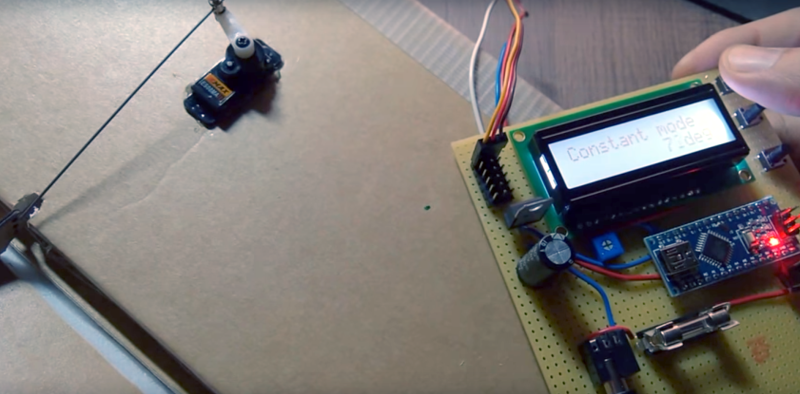RC flying is one of those multi-disciplinary hobbies that really lets you expand your skill set. You don’t really need to know much to get started, but to get good you need to be part aeronautical engineer, part test pilot and part mechanic. But if you’re going to really go far you’ll also need to get good at electronics, which was part of the reason behind this Arduino servo tester.
[Peter Pokojny] decided to take the plunge into electronics to help him with the hobby, and he dove into the deep end. He built a servo tester and demonstrator based on an Arduino, and went the extra mile to give it a good UI and a bunch of functionality. The test program can cycle the servo under test through its full range of motion using any of a number of profiles — triangle, sine or square. The speed of the test cycle is selectable, and there’s even a mode to command the servo to a particular position manually. We’ll bet the build was quite a lesson for [Peter], and he ended up with a useful tool to boot.
Need to go even further back to basics than [Peter]? Then check out this primer on servos and this in-depth guide.
[via r/Arduino]
















Very useful, but definitely deserves a rotary encoder with push button
Looks effective, but scant details provided. I’ve used Mikael’s Servo Tester 1, written in AVR assembly, which performs very well:
http://www.ejberg.dk/portfolio/servo-tester-1/
He has a second, more complex revision posted elsewhere on his site; seemingly enough to satisfy the most fanatical servo-testing enthusiast.
Every time I need to interface something to an Arduino I write a device driver and test program.
Most of my test programs take simple serial commands to control the device through the driver. The intent was to be able to test any piece of hardware to see if it’s working and the connections are correct.
For example, the servo test program will handle up to 4 servos (without expanding the driver) and lets you type in a command that sets any individual servo to any specified position.
The test programs themselves also serve as a foundation to build actual programs on; for example, the test program that commands servos can be copied and modified to do whatever you need the servos for.
I’ve currently got 77 library drivers and 29 test programs in my Atmega folder. These include tests for servos, steppers, Motors, AtoD, SPI, UART, and a host of various ICs.
I’ve been wondering if there’s any interest in making these public – I could possibly put these up on GitHub so other people could use them.
(Note: These are bare-metal programs, not sketches. As I used to do firmware professionally, all files are well laid out and commented in a professional manner.)
Thoughts?
..sounds good and would be a nice valuable contribution for the “community” !
You could make me happy with it.
Please do publish those, that would be helpful to a lot of people.
Heck yeah!
i built something similar with a 555 timer and some junk. its enough to verify the functionality of servos and also throttle an esc. probibly not good if you want to thoroughly quantify the performance of a servo.